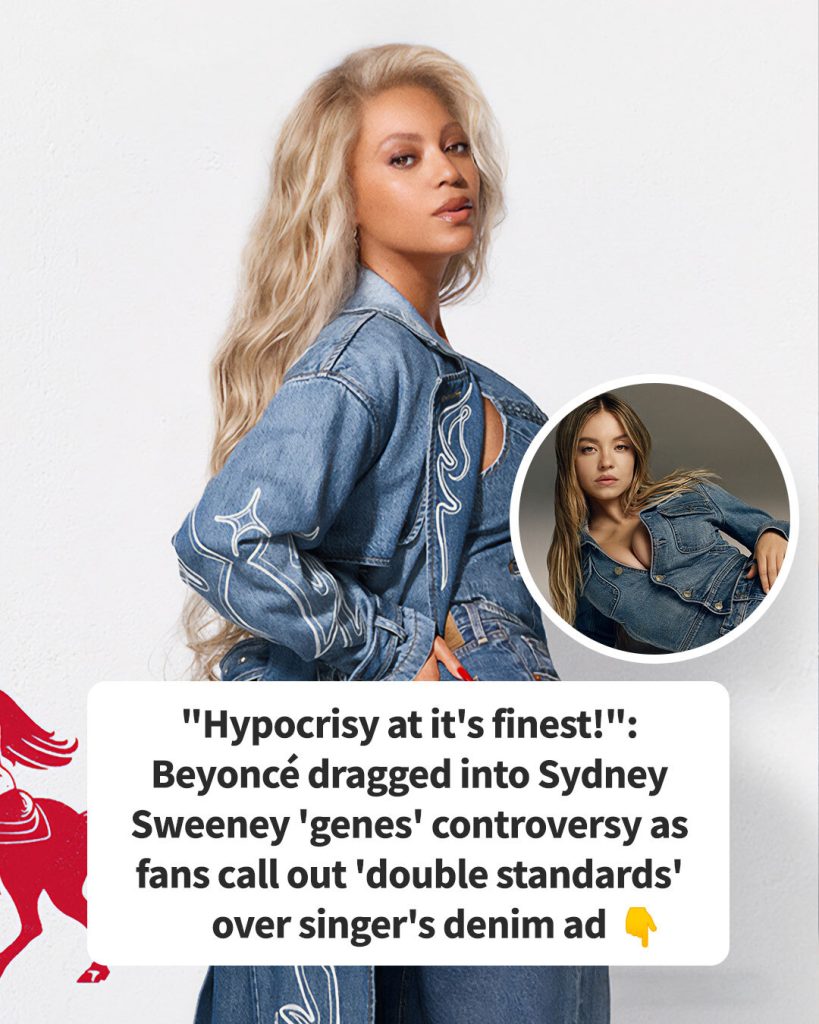As controversy continues to swirl around Sydney Sweeney’s recent collaboration with American Eagle, the fire has spread beyond denim and into a broader cultural and political debate. What began as a seemingly harmless jeans campaign has now become a flashpoint for accusations of racial insensitivity, coded messaging, and a clash of public figures. Even Beyoncé’s Reimagine partnership with Levi’s has been pulled into the conversation, further intensifying the discourse and drawing battle lines between fans, celebrities, and media outlets.

It all started with what looked like a successful marketing move. When American Eagle announced Sydney Sweeney as the face of their latest denim campaign, their stock surged by 19%, riding on her popularity. Sweeney, known for her roles in TV and film, brought a glamorous presence to the campaign. But things quickly shifted once the video ad featuring her aired. While the visuals were well-executed, the monologue she delivered became the center of heated criticism.
In the ad, Sweeney says in a sultry voice, “Genes are passed down from parents to offspring, often determining traits like hair color, personality, and even eye color.” She then ends the segment with, “My jeans are blue.” What was clearly meant to be a clever play on words—linking ‘genes’ with ‘jeans’—struck many as tone-deaf and even disturbing. Social media quickly erupted with interpretations that the ad carried undertones of genetic supremacy, especially in the context of her blonde hair and blue denim outfit.
Doja Cat was among the first celebrities to react. Breaking her online silence, she mocked the ad using an exaggerated rural accent to mimic Sweeney’s tone, which sent her fans into a frenzy. “You know it’s bad when even Doja makes fun of it,” one fan tweeted. Another joked, “Doja Cat mocking Sydney Sweeney was not on my bingo card for this year, but I’m not complaining.” The reaction wasn’t limited to humor—it was a signal that the campaign had struck a nerve.
Not long after, Lizzo joined the conversation. She posted an image mimicking Sweeney’s pose and captioned it with, “If the Democrats won the election,” followed by, “My jeans are black.” The post carried more than just sarcasm—it was a pointed commentary on how racial identity is portrayed and perceived in mainstream advertising. One fan echoed Lizzo’s sentiment by commenting, “My genes are Black. My genes built this country. My jeans are made from the same cotton this country was built on.”
As the controversy escalated, others began questioning whether similar campaigns featuring Black artists received the same scrutiny. Fox News entered the fray by posting an image of Beyoncé in a denim campaign with Levi’s, noting that she, too, wore blonde hair and a sultry look. The caption included a quote from Nicole Saphier, a regular Fox News medical contributor, who said, “Just going to leave this pic from Beyoncé’s Levi’s campaign right here for those saying Sydney Sweeney with her blonde hair/denim/sultry look is racist.”
Supporters of this perspective claimed the backlash against Sweeney revealed a double standard. One commenter wrote, “There’s always double standards with the left. Their way or the highway.” However, critics were quick to point out that the problem wasn’t the denim, the blonde hair, or even the sultry aesthetic—it was the specific wording and implications of the “genes” line in Sweeney’s ad that triggered the reaction.
“It’s not about the denim—it’s the eugenics reference,” one user wrote. “Good for you guys for completely missing the point.” The concern, many explained, was rooted in historical trauma and the use of pseudoscience around genetic superiority, which has been used to justify racial oppression. This kind of language, even when unintentional, can reopen painful wounds.
A user on X (formerly Twitter) attempted to offer a thoughtful explanation, writing: “At what point will it be fully understood that proclaiming or implying ‘my genes (jeans) are better’ is frightening to any race whose ancestors for long generations have had to suffer at the hands of the very same race of people with the same kind of thinking—that their genes are superior?”
He continued, “No. Such statements are not benign; they are echoes of a violent and dehumanizing history. And the fact that you involve Beyoncé as a defense only shows how disconnected some people are from the emotional weight behind the outrage.”
Unfortunately, this more nuanced take wasn’t widely accepted either. Many people in the comment section dismissed it or ridiculed the attempt at a deeper conversation. The backlash to the backlash, as it were, reveals how divided the public is when it comes to interpreting media and advertising through a socio-political lens.
Meanwhile, American Eagle seems to have taken notice of the controversy. In their latest promotional material, the company has noticeably changed course, casting a model who looks nothing like Sweeney and choosing to sidestep any references that could be perceived as racially or politically charged. Whether this is a calculated PR move or a genuine attempt to reflect greater sensitivity remains up for debate.
What’s clear is that in today’s hyper-connected and hyper-aware society, even a simple play on words in a fashion ad can spark a cultural firestorm. While some see the criticisms as overreactions, others view them as necessary conversations about how language, imagery, and identity intersect in powerful—and sometimes painful—ways.
The uproar surrounding Sydney Sweeney’s ad isn’t just about fashion. It’s about perception, history, and how public figures and brands choose to communicate. And as more voices enter the debate—from celebrities to news outlets to everyday users online—the incident continues to highlight just how quickly the line between marketing and messaging can become a battleground. Whether this results in lasting change for how brands craft their narratives remains to be seen. But for now, it’s a moment that forces reflection, sparks conversation, and reveals the depth of emotion still attached to the simplest of words.





